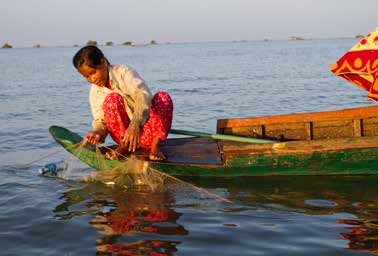
Description of the project: Sustaining the endangered ecosystem of lake Tonlé Sap is a matter of survival for 8,000 Cambodians and of crucial regulation for the entire Mékong area. With an integrated approach targeting emissions reduction via fuel-efficient fish processing and women’s economic and social empowerment – via trainings to improve environmental knowledge, hygiene practices, packing, marketing, and pooling of sales, this project transforms traditional fish smoking methods that have become unsustainable into climate resilient livelihood activities. By changing the perception of women’s roles, it challenges patriarchal structures to ensure gender just decision making that promote ecological conservation initiatives.
Climate impact: Fuel efficient stoves reduce carbon emissions and and wood consumption, helping protect the fragile ecosystem of the of lake Tonlé Sap, based on flooded forests, an exceptional natural fish nursery. Education in the communities about specific climate change impacts on the Tonlé Sap and possible ways to mitigate these threats is backed by the development of financial buffering through increased revenues for women. The creation of saving groups enable investment of the loans’ interest into conservation projects, strengthened by the implementation of protected areas.
Gender impact: Gender equality and women‘s empowerment is promoted in many ways, alleviating women’s burdens through efficient smoking technology. Girls’ school enrolment is up 60%. With sales increased by 32% without adding pressure on the fisheries, women’s economic power and self-confidence has been raised. Sixteen saving groups in seven villages foster women’s entrepreneurship. This results in informed and outspoken women participating in decision-making processes in the fishery committees, which benefit from the saving groups investments and must report about their priorities and conservation activities.
Scalability / replicability: This integrated conservation and development model builds on existing community efforts and is being expanded to other villages of the Tonlé Sap, with the support of the Ministry of Agriculture and Fisheries. Sustainability and expansion are favored by the communities’ ability to negotiate directly with the private sector and distributors based in Phnom Penh. Conservation International is also sharing lessons learned with 10 local NGOs and communities from the Mekong and around the Tonlé Sap.